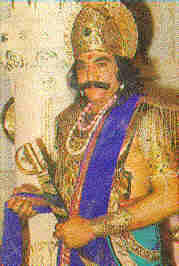This is coolbert: Pre-historic warfare must be a hard subject to study? Of course, there are no accounts of histories or anything of that sort that would be considered to be reliable. Myth, epic poems, etc do provide some information that can be used however. From these sources some inferences can be made that point to certain commonalities of the Indo-European peoples with regard to war.
The Indo-Europeans are believed to have been a people living in the Eurasian steppe land north of the Black Sea about 6000 years ago. A semi-nomadic people who migrated westward in Europe, and southeast into India. Conquering the peoples of those lands, absorbing them and dominating them. The Indo-Europeans can be thought of not as a race, but rather as a linguistic group and also a group having certain cultural affinities. All the languages of Europe with a few exceptions and those dominant languages of India [Hindi for example], show a marked affinity to the language labeled proto-Indo-European.
One of these cultural traits shared by these various groups throughout the geographic area controlled by the Indo-Europeans was how wealth was measured. Wealth was measured by the lord acquiring and maintaining herds of cattle, herds of cattle guarded by armed men on horseback [some people have speculated that the Indo-Europeans were the first to tame the horse]. These herds would move from grazing place to grazing place along the steppe land, followed by the semi-nomadic herders in their covered wagons. Covered wagons that resemble the bullock carts of today's India. These wagons were always pulled by cows or oxen, and not horses. It is interesting that this same pattern of behavior was followed by the descendants of the Indo-Europeans where ever they spread out all over the world. The man with his herd of cows is a romantic figure where ever found. This may be the cowboy of the Great Plains of North America, The jackeroo of Australia, the trek boer of South Africa, and the gaucho of the pampas of Argentina. [Interestingly enough, the living descendants of the original Indo-Europeans, about 20 % of the world's population, are the only ones that can easily digest milk and milk products. Indo-Europeans are the descendants of hundreds of generations of cattle herding people that used milk and milk products as part of their diet on a regular basis].
It is known that these armed men on horseback did engage in warfare. When we think of warfare of this period, do not think of warfare as we understand the term now. Think of warfare as being what we could call cattle rustling today. The ancient Sanskrit word for war is gavisti. This is translated as "the desire to acquire cattle". Cattle rustling. Armed men on horseback raiding another adjacent tribe to steal cattle and gain further wealth. In India, to this day, the protectors of cattle are the kshatriya caste. The warriors and rulers. Gautama Buddha was of this caste. In the Hindu caste system, The kshatriya caste are portrayed as the "arms" [brahmin are the priests and the head [educated], Vaishyas [merchants], as the body, and sudra [laborers], legs]. A very logical way of organizing things. The protectors of the cattle, the kshatriya, use "arms", strength, with swords, to accomplish their mission. Read more about gavisti, and the kshatriya, by clicking here and here.

Further evidence that war in pre-historic times resembled not what we have today, but what we could call more correctly cattle rustling is the epic poem of ancient Ireland, "The Great Cattle Raid of Cooley". Describes an event in the distant past where one tribe in ancient Ireland attempted to raid and rustle the cattle of another tribe. What went on in this raid can only be described as war, war without the carnage and devastation we now experience and have come to expect, but war nonetheless.
"This meant that there was not as much carnage as occurs in modern warfare and only those specifically trained in Warcraft would be involved."
Read more about the events of ancient Ireland by clicking here.
coolbert.

0 Comments:
Post a Comment
Subscribe to Post Comments [Atom]
<< Home